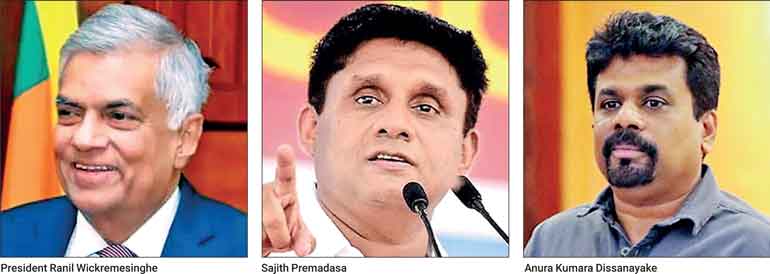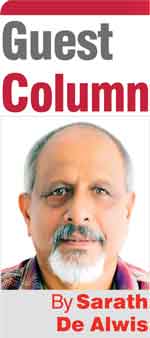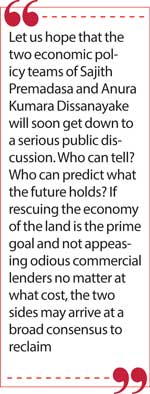Saturday Feb 14, 2026
Saturday Feb 14, 2026
Thursday, 11 April 2024 00:20 - - {{hitsCtrl.values.hits}}

 No society can surely be flourishing and happy, of which the far greater part of the members are poor and miserable.
No society can surely be flourishing and happy, of which the far greater part of the members are poor and miserable.
– Adam Smith
“The difficulty lies not so much in developing new ideas as in escaping from old ones.”
― John Maynard Keynes
When the sufferers learn to
think, then the thinkers will
learn to suffer.
– Karl Marx
It is showdown time. I borrowed the caption from the ‘The Second Coming’ by W.B. Yeats. Things fall apart and the centre cannot hold. Passionate intensity dictates debate.
The next election, Presidential or Parliamentary will be a ‘head-to-head’ encounter between the ‘dominant’ and the ‘dominated.’
Despite polls and engineered parades, the dismantling of the hegemony of the dominant class is not a certainty. Since hope is not optimism, I would say that it is a near certainty.
The Bastille will be breached. If not totally, substantially. 2024 is the year when people of Sri Lanka will prove Heraclitus right. “No man ever steps in the same river twice, for it’s not the same river and he’s not the same man.”
The ‘dominant’ includes the elite, the establishment, the privileged and most critically the crony class of the rich.
The ‘dominated’ are the masses, the not so privileged, the underprivileged, the poor and the forgotten.
The ‘Economic Council’ of the SJB has challenged the ‘Economic Council’ of the NPP for a serious exchange of views on their respective readings of our nation’s predicament and how each side plans to overcome sovereign default.
The credentials of the SJB trio are widely known. They exemplify the ‘establishment’. Most importantly, all three held political office under President Ranil Wickremesinghe who is now directing negotiations with our Commercial creditors – chaps who bought our ‘International Sovereign Bonds’.
Lest we forget most of these ISBs were issued under the ‘Yahapalanaya’ time 2015-2019 when all three gentlemen of the SJB’s economic council served as Ministers of State.
Of the NPP’s economic council only one could claim a readily identifiable public persona. As chairman of the Parliamentary Committee that investigated and exposed the ‘Bond Scandal’ of January 2015 he earned the admiration of ordinary people who for the first time discovered the bonds that bind the powerful and the greedy. The other two are obscure academics and are not practiced speechmakers.
 Of the SJB trio, two are Royalists and one attended both Royal and Trinity.
Of the SJB trio, two are Royalists and one attended both Royal and Trinity.
The NPP trio are most unlikely to have attended such ‘Pukka-Sahib’ public schools or possess the elan to do a ‘Baila Jig’ with the US ambassador.
But as Professor Anil Jayantha of the NPP points out Economics is not rocket-science. He is right. Daniel Kahneman a psychologist won the Nobel Prize for his research on how people arrived at decisions by applying cognitive psychology. Paul Romer won the Nobel Prize for Economics for his Endogenous Growth theory. He famously said, “Yeah, you know, there’s a difference between the textbook world that economists like to imagine, and the real world where real people have real feelings.
NPP’s economists would be more worldly. They will know that the poor would prefer to have their children properly educated. Since they cook only once a day, they may not want refrigerators. The poor don’t need air conditioners. They prefer the shade of a giant tree and may not want the chopped down.
The haves and the have-nots
But as Dr. Harsha de Silva pointed out at a recent press conference, the country should know what the two sides stand for. When I say two sides I mean two sides. The haves and the have-nots.
The political sophistry to seek a distinction between Ranil’s UNP and Sajith’s SJB when there is no difference between their respective approaches to restructuring our commercial debt escapes my limited intellectual capacity.
May be I too am a ‘Yakko’ or a ‘Godaya’ type to have got seduced in my youth by the abundant humanity in Karl Marx’s writings – his essential discovery of the exploitative and self-destructive nature of capitalism.
Karl Marx was a great philosopher and a historian. He was fallible. He was wrong in some of his theories. But he was right on one simple diktat. Pure pursuit of self-interest would lead to anarchy. He did not foresee a Lenin attempting to try out his theories in the primitive agrarian society of Russia. That said despite Stalinist distortions Russia’s central planning put a sputnik in to orbit before the Americans.
By the way, NASA was funded by American taxpayers’ money. The research on developing the ‘internet’ was also funded by Research Agencies of the US Defense Department. There is something to be said about central planning.
Instead of mocking Karl Marx Dr. Harsha de Silva must look up what President Xi Jing Peng told the last Communist Party Congress of China.
“We commemorate Marx in order to pay tribute to the greatest thinker in the history of mankind,” Xi told the 19th Congress.
Analysing Chinese version of revised Marxist manifesto is not the purpose of this essay. So, I shall not digress.
Let us hope that the two economic policy teams of Sajith Premadasa and Anura Kumara Dissanayake will soon get down to a serious public discussion.
Who can tell? Who can predict what the future holds?
If rescuing the economy of the land is the prime goal and not appeasing odious commercial lenders no matter at what cost, the two sides may arrive at a broad consensus to reclaim.
A. our collective sanity.
B. restructure our debts in a manner that avoids the whirlpool of more and more debt.
The SJB economic wizards should be familiar with the seminal study of financial folly of sovereign nations for the past eight centuries by Carmen M. Reinhart and Keneth S. Rogoff published in 2011.
Mind set of every defaulting sovereign
It is aptly titled ‘This Time is Different’. That is the mind set of every defaulting sovereign. Somehow, we will be different. Somehow, we will get it right and will be on our way to growth and glory. History tells us different. Reinhart and Rogoff in the best empirical investigation of financial crises say that no sovereign defaulter has escaped serial default.
“Lightning may never strike twice in the same place, but the same cannot be said of sovereign default. Throughout history governments have demonstrated that “serial default” is the rule, not the exception. Argentina has famously defaulted on five occasions since its birth in the 1820s.”
I am not an economist. Therefore, I shall avoid treading further in to disputed territory. But I must inform the readers of this missive what these two resected academics stress strongly. “…Large scale debt buildups pose risks because they make an economy vulnerable to crisis of confidence, particularly when debt is short term and needs to be refinanced. Debt fueled booms all too often provide false affirmation of a government’s policies, a financial institutions’ s ability to make outsized profits, or a country’s standard of living. Most of these booms end badly.”
This is a subject for experts better informed, more pragmatic, and disciplined. I shall therefore desist from venturing further.
The naïve, the gullible and the chattering class
That said, the naïve, the gullible and the chattering class that reposes faith in the messianic pundit and chosen medicine man of the Rajapaksa tribe to guide us towards a sanguine recovery just round the corner are no better than Alice in Wonderland. When I listen to the brash promise for a developed Sri Lanka in 2048, I think of Alice’s Wonderland. “Imagination is the only weapon with reality.”
ISBs constitute the most complex and heaviest of portion of our debt burden.
A near 70% of this ISBs were issued during the period 2015-2019 under the ‘Yahapalana’ Government.
There is a cruel irony in this mad theatre. Sri Lanka entered the International Capital Market in 2007. The story of how we did what we did is described in a paper ‘Sri Lanka Steps into the International Capital Markets’ by Assistant Governor C.J.P. Siriwardena in the CBSL’s commemorative 60th Anniversary Commemorative Volume.
For the benefit of those interested in our economic history he records: “The main opposition political party opposed the sovereign bond issue strongly with a threat that they would not honour under their government, obligations arising from the bond issue.”
The Sunday Times of August 2007 reported that the UNP had written to three foreign banks informing them that a future UNP government would not honour the repayment of the proposed $ 500 million bond to be taken by the Government, Opposition Leader Ranil Wickremesinghe declared.
He said by the time we pay back the loan in another decade; the amount would be as high as $ 850 million or Rs. 12,000 million making the nation a debtor for 10 long years to HSBC. (https://www.sundaytimes.lk/070826/News/nws5.html)
In 2015 the new government did not repudiate the ISB debts. Instead, it floated yet another ISB issue for $ 650,000,000 due in 2025.
The Government specified the use of proceeds. “The Government will use the net proceeds from the issue of the Bonds (estimated to be $ 648,067,737 after deduction of underwriting commission and fees as well as estimated expenses) to fund ongoing and/or new development projects of the Government.”
Now whenever, we ask the SJB’s economic experts why they raised such huge ISB loans, the standard response is that they had to roll over Rajapaksa folly.
It is a classic exemplification of the maxim suppress truth to suggest a falsehood ‘Suppresio Veri’ – Suggestio Falsi.
In the CBSL annual report for 2015 under External Sector Policies and Developments 5.11.2 there is a curious disclosure couched in convoluted jargon.
“Meanwhile, the Central Bank intervened in the domestic foreign exchange market as a net supplier throughout the year. Accordingly, the Central Bank supplied US dollars 3,429 million to the market, while absorbing US dollars 179 million, resulting in a supply of US dollars 3,250 million, on a net basis, during the year.”
During the Yahapalanaya years 2015-2019 the Central Bank regularly intervened to stabilise the Rupee by supplying Dollars to the market while floating ISBs.
Borrowing Dollars in international capital markets at 7% annual interest while supplying Dollars to peg the Rupee is anything but economics.
The NPP economists should ask their SJB counterparts to explain the rationale of borrowing in the international capital markets to defend the Rupee which despite all efforts soared from Rs. 131 to the dollar in 2015 to around Rs. 180 to the dollar in 2019.
A young motor enthusiast tells me that during years 2017 and 2018, the country imported the highest number of Land Rover Range Vogue SUVs to the country. I don’t know what they are but on inquiry I was told that they were the preferred chariots of our modern-day Caesars of filthy lucre. No doubt those owners of such exotic chariots would want continuity of vulgar Bourgeoisie opulence no matter the price.